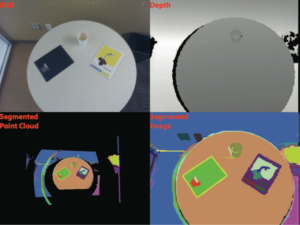PhD Thesis (2014) by Yachna Sharma on “Surgical Skill Assessment Using Motion Texture analysis”
Thesis title: Surgical Skill Assessment Using Motion Texture analysis
Yachna Sharma, Ph. D. Candidate, ECE
http://users.ece.gatech.edu/~ysharma3/
Committee:
Prof. Irfan Essa (advisor), College of Computing
Prof. Mark A. Clements (co-advisor), School of Electrical and Computer Engineering
Prof. David Anderson, School of Electrical and Computer Engineering
Prof. Anthony Yezzi, School of Electrical and Computer Engineering
Prof. Christopher F. Barnes, School of Electrical and Computer Engineering
Dr. Thomas Ploetz, Culture lab, School of Computing Science, Newcastle University, United Kingdom
Dr. Eric L. Sarin, Division of Cardiothoracic Surgery, Department of Surgery, Emory University School of Medicine
Abstract:
The objective of this Ph.D. research is to design and develop a framework for automated assessment of surgical skills.Automated assessment can help expedite the manual assessment process and provide unbiased evaluations with possible dexterity feedback.
Evaluation of surgical skills is an important aspect in training of medical students. Current practices rely on manual evaluations from faculty and residents and are time consuming. Proposed solutions in literature involve retrospective evaluations such as watching the offline videos. It requires precious time and attention of expert surgeons and may vary from one surgeon to another. With recent advancements in computer vision and machine learning techniques, the retrospective video evaluation can be best delegated to the computer algorithms.
Skill assessment is a challenging task requiring expert domain knowledge that may be difficult to translate into algorithms. To emulate this human observation process, an appropriate data collection mechanism is required to track motion of the surgeon’s hand in an unrestricted manner. In addition, it is essential to identify skill defining motion dynamics and skill relevant hand locations.
This Ph.D. research aims to address the limitations of manual skill assessment by developing an automated motion analysis framework. Specifically, we propose (1) to design and implement quantitative features to capture fine motion details from surgical video data, (2) to identify and test the efficacy of a core subset of features in classifying the surgical students into different expertise levels, (3) to derive absolute skill scores using regression methods and (4) to perform dexterity analysis using motion data from different hand locations.

